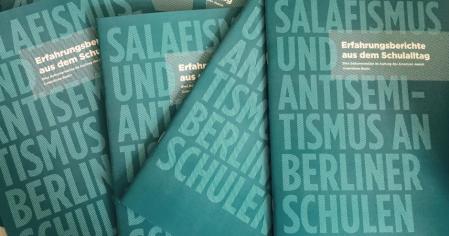Share on
An AJC survey of Berlin public school teachers reveals the growing infiltration of Salafism, and a corresponding increase in antisemitism in classrooms.
“Salafism and the antisemitism inherent in this ideology are broad societal problems that are now affecting Berlin schools,” said AJC Berlin Director Deidre Berger. A branch of Islam that adheres to a fundamentalist interpretation of the Koran, Salafism has inspired radicalism and jihadism among some of its followers. German intelligence authorities have reported that the number of Salafists, nearly 10,000 today, has grown considerably in recent years.
The survey, “Salafism and Antisemitism in Berlin Schools: A Report from the Classroom,” was commissioned by the American Jewish Committee (AJC) Berlin Office, and carried out in cooperation with the Berlin State Government and the Berlin-Brandenburg State Institute for Education and Media (LISUM). It was presented at a recent press conference in Berlin.
The study is based on interviews with 27 teachers from 21 schools in eight Berlin districts. The interviews took place between fall 2015 and spring 2016.
The survey findings “make clear that increased support for teachers and new teaching materials on the subject are needed,” states the AJC Berlin report. “Additionally, it underscores the importance of dealing with this phenomenon by taking a more proactive approach.”
The teachers interviewed spoke about difficult encounters they had with students in their classrooms, where there is “a pronounced conflict between the religious ideas of some students on the one hand the values of a democratic society on the other,” states the report.
Antisemitic attitudes are so widespread that many Jewish students are leaving public schools due to bullying from peers. The phrase “You Jew” is a common insult among students, the teachers reported.
“For some teachers it has become nearly impossible to teach Jewish-related topics or discuss the Mideast conflict,” states the AJC Berlin report, noting that Israel is demonized by students, with teachers reporting cases of pupils crossing out Israel from maps and atlases.
A number of teachers reported that they are ill-prepared to confront the issues raised by Islamism and manifestations of antisemitism within parts of the Muslim community.
Another problem, identified in the 2015 report of the German-Israeli Textbook Commission, is the treatment of Israel, which is portrayed almost exclusively in the context of the Middle East conflict, without further explanation of Israel’s democratic society, and partnership with Germany.
During the interviews, teachers called for greater emphasis on media literacy and video analysis in the classroom in order to enable youth to recognize propaganda and misinformation, since the internet and social media have become such popular sources of information about Islamic extremist ideology among high school students.
While Germany has long faced the challenge of integrating immigrants into its school system and the wider society, the massive influx of Muslim migrants and refugees from the Middle East has further complicated the situation. More than 70,000 refugees, many of school age, arrived in Berlin in 2015 and 2016 from countries without democratic traditions, and where antisemitism often is state ideology.
“The ways in which these newcomers can be integrated into the democratic values and social coexistence in Germany is vital for Germany’s social cohesion. Schools play a key role in this process,” states the AJC Berlin report.
The survey was conducted while a teacher training program was underway to provide guidance, information, and tools to deal with these issues in the classroom. The first cohort of the two-year training program, involving 30 teachers from 21 schools, will complete their studies in September.
“Our public-private cooperation with the Berlin state and federal governments to address the issue of Salafism and antisemitism in Germany is unique. I am confident that it can serve as a model far beyond Berlin in helping to address what is clearly a national problem,” Berger said in her remarks at the press conference.



